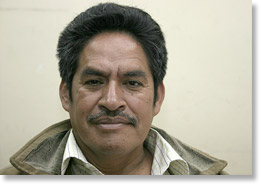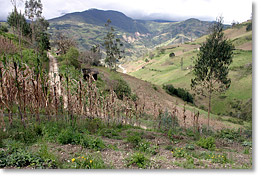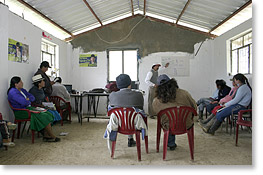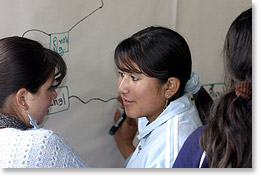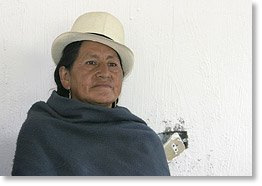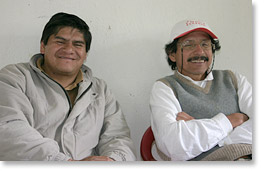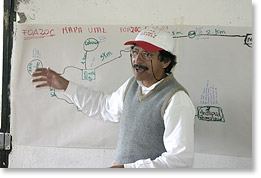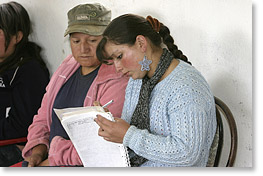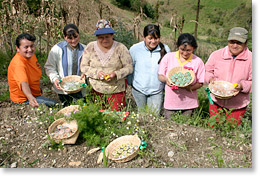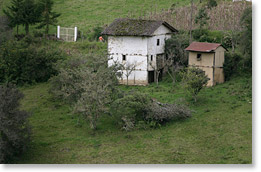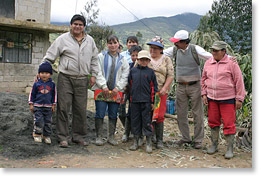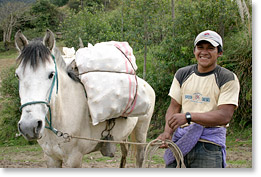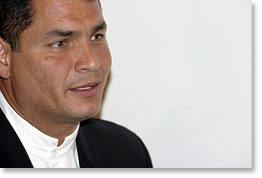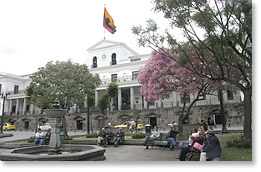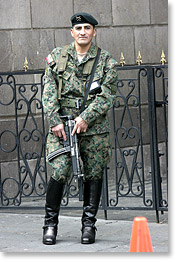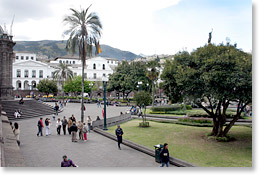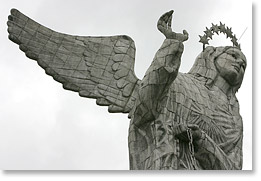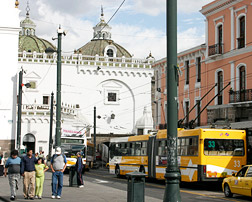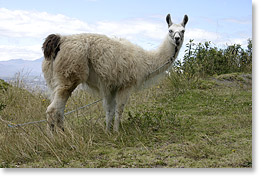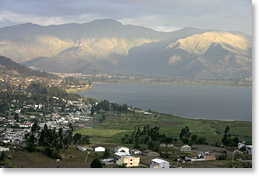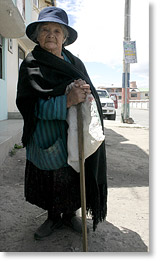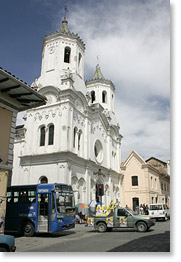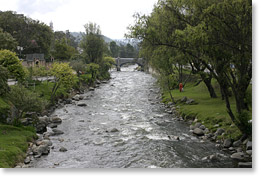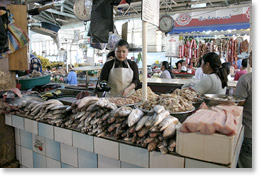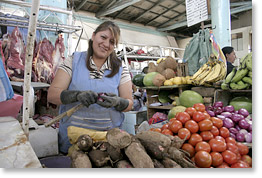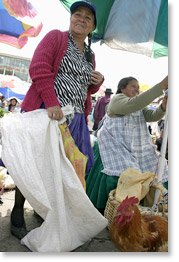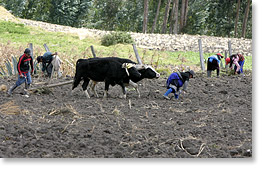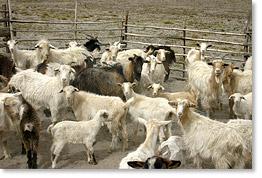|
Interview with Diogenes Lucio of FENOCIN
The National Confederation of Peasant, Indigenous, and Black Organizations Agroecology and the Andean Cosmovision
Diogenes Lucio: My name is Diogenes Lucio and since May of 2004 (until 2008) I have been national director of legal affairs and human rights for FENOCIN. And, perhaps, because of the experience that I have, I have also been asked to coordinate FENOCIN’s agroecology projects in such a way that now we are working in 14 provinces on a national agroecology program. Up until then, we were like a national federation, a “level-three” organization. In the 2004 Congress, it was resolved to raise the category, to no longer be a federation but a confederation, but maintaining the same name, the same acronym. In this way, we became a “fourth-level” organization, the National Confederation of Campesino, Indigenous, and Black Organizations. We kept the same name because we did not want to lose the historic process that is reflected in the organization’s acronym. What was also good from this 1996 Congress was the agroecology program which internally we agreed to begin and to include in the productive development of the countryside. Up until then, we had only come forward with struggles demanding rights -- the struggle for land, the struggle for water, the struggle for local roads, the struggle for healthcare centers, for rural infrastructure. We had not organized around field production. Coming out of this ’97 congress, we agreed to include field production development. Believing that it was necessary to control and to conserve our natural resources, we began to work on what is, practically, productive agricultural rural development, but with an organic focus which we have called agroecology. We have been developing various projects and, fundamentally, this work is in response to the current system because the system, practically speaking, has oppressed us, above all the sectors of the people first affected by the signing of ALCA (Free Trade Area of the Americas). We, as a people’s organization, we saw the risk for our campesino-compañeros and therefore we strongly opposed it. Afterwards, they changed the name to the Free Trade Treaty and we opposed signing up to this treaty just as strongly. As a response to these policies we have been developing a national program of organic production that is better and which we call revitalized ancestral agriculture. This means rescuing the ancient knowledge of production of our ancestors -- revitalizing it a little, combining it in field production with modern technology as long as it is not destructive to the ecosystem. Let us combine it, energize it, let us put it at the disposal of the Ecuadorian citizenry. In this sense, this ancient, revitalized agriculture is a comprehensive program that we are developing not only with the view of it being for FENOCIN, but a program which can be converted into national public policy for our country -- to rescue the very valuable knowledge that our elders had in their productive processes. They never needed chemicals. They never needed (genetically) modified seeds. They kept them (seeds) for life, and there is evidence that the ancient historic seeds were very resistant to pests and disease and were very nutritious. So, we have been vigorously promoting this national FENOCIN program. We have been successful, and it is also functioning in various other fraternal national organizations which are very interested in applying this technology. With this technology we are using the “farmer to farmer” methodology which is coming on strongly as a method of “solidarity production”. If I have some knowledge, I am open to sharing it with another compañero-campesino, open to teaching it to another campesino, and open to learning from him. Therefore, it is called “farmer to farmer”. It is a more supportive methodology of sharing heritage our ancestors gave us, than that of the agribusiness producers who, when they discover a technology or investigate a technology, they keep it secret. They don’t want others to know about it. This (our) program is the opposite. We make it available for all who want to learn it. It is, as I say, a more supportive system. Above all, what is expected is a more sovereign production (of crops), that is not imposed from outside and not our own. This even includes food processes; that we feed ourselves in a sovereign way. We don’t have anything against the American system but this treaty would have imposed on us a productive system in which we forget our traditional practices and that would be very risky for us because here in our country no one has ever been subsidized, even a single cent. We are able to produce differently than in the United States where farmers are subsidized throughout their productive cycles. They are easily able to have much lower costs, and that is going to break the productive system for our compañero-campesinos because here in order to produce a yuca (cassava) plant they must invest from their own pocket. They are not able to give away what they produce. That is a big difference and we do not want this inequality. That is why we fought stubbornly to not have that Free Trade treaty signed. And FENOCIN was not alone in fighting this. We succeeded in raising awareness among many other social movements. We made a single block for a joint struggle with almost all the social movements in our country. Clearly, a lot of people came, even from the United States in order to hold conferences, roundtables, to spread the word about the intent of the Free Trade treaty. We achieved raising awareness among the citizenry as a whole. This included, even, for example, the defeat of Colonel Lucio Gutierrez. When he was president he fully intended to sign the Free Trade treaty, and he was defeated precisely because of this situation. The Ecuadrian people rose up and dismissed him and named an interim government. Alfredo Palacio was the interim president. Now, with this new government (President Rafael Correa) it is said that we will not have these types of treaties which are threats against the sovereign interests of our compañero-campesinos. An intercultural country We have organizations in all these regions and our organization is not selective. That is to say, the indigenous, the Blacks, we have all understood that our country is one, and we say we will work for one integral whole. That is why the indigenous, the farmworkers, the Montubio, the Blacks, are all our friends. They are within the organization. We have integrated with them, as is recognized in the acronym FENOCIN, which is why we are the National Confederation of the Farmworker, Indigenous, and Black Organizations. Recognized or not, our country is intercultural. Agrarian reform: a dignified life In Motion Magazine: What is the agrarian reform situation in Ecuador? Diogenes Lucio: For me, personally, there has never been any agrarian reform in Ecuador. Yes, an agrarian reform law was created ’64, which was the first agrarian reform law, and in ’89 this law was re-done, but here, in our country, agrarian reform was not made. The only thing that was done was to distribute land which had not been settled. But agrarian reform, as such, never occurred. Besides that, what I want to see in the law is technical assistance, credit, improvement in the agricultural infrastructure in our country. Never were these benefits given to the campesinos. At no time did the land reform affect the lands of the good quality haciendas. Therefore, for me, agrarian reform never happened. What we want now, and we are promoting as a proposal, is the incorporation into the new constitution of laws which legislate in favor of a “reinclusion” of land. This involves immediately doing agrarian reform in our country, though at no time are we saying we are going to take land from anyone. We have to work together with other organizations around a space we call the “agrarian table”. From this coordinating body we have managed to develop a proposal for an agrarian reform agenda for the country. This agrarian agenda involves, on the one hand, the state concerning itself with the distribution of land to the campesinos, and, on the other hand, it involves lines of preferential credit for production in the field, technical assistance, developing infrastructure, and, really, a dignified life in the field. A dignified life for us means assistance with health, education, dignified housing for campesinos -- unlike where we live now, living in practically inhuman conditions, which is not dignified for us campesinos -- despite our being the principal producers of the most needed products for the country. And this is because what the big companies do is produce for export. They don’t produce for the survival of the country. We, the small and medium-size farmers produce to sustain the country. So, the function of the state should be to concern itself with giving preferential treatment to small and medium-sized producers. This agrarian agenda pulls together all our principal aspirations. As I say, we are working hard so that the new constitution takes up these aspirations so that the law favors the peasants. Food sovereignty / food security In Motion Magazine: Would you like to speak a little about food sovereignty? Diogenes Lucio: Of course. We say that we are working hard for “food sovereignty” in particular because it is not the same as what many NGOs call “food security”. For us, food security is when I do have money I can go to a market and buy products. I can secure food for my family, but I do not know under what conditions that product has been made. Here is the difference between food security and food sovereignty. Food sovereignty is having sufficient food for the family, never suffering a need for food, and this impies valuing the natural resources of our small farm. If we produce organically, cleanly, I can provide all we need on our small farm. I can even economize and not have to buy chemical products. I can produce my own organic inputs (such as fertilizers, seeds, other supplies) for application on my land. I convert myself into a sovereign farmer, without external dependence. I am getting all the value from my land. Agroecology: sustainable and low cost In Motion Magazine: How does agroecology help reduce poverty? Diogenes Lucio: There are different ways. Agroecology must be a low cost system. It has to be a system with speedy results. It has to be a system which guarantees to me the sustainability of my small farm. And, when I say low cost, as I said before, I have to be free from external dependency, not depending on a liter of fertilizer for which I have to leave the countryside for a day to travel to a store to buy in the city. I am wasting a day of work, the cost of the inputs, and falling into dependency in general. Rather, (with agroecology) even as I produce I invest in other family necessities. I can save economic resources, and also guarantee the health of my family because I am freeing us from an infection, or contamination from chemicals. Also, I am enriching my plot of land. That is the difference. Each day that I apply agro-toxics, I am destroying the future of my family, and later I will find I have a desert-like soil which will be good for nothing. Agroecology is a well-analyzed system and it is not costly. This has been shown statistically. Rather, things become costly when I must buy inputs from the outside. It is a good productive system which, as I said, has provided every resource and guarantees the sustainability of the soil on our small farm. In Motion Magazine: Can you talk a little about some agroecological projects you are doing in different parts of Ecuador? Diogenes Lucio: Yes. Basically, we make a brief analysis of our land, and, in accordance with the needs of the land, we identify materials in different areas with which to make liquid and solid concentrates for the soil -- according to the needs of the soil, because not all soils need the same thing. We begin to identify the materials we have in each area. Generally there are legumes, insect repellants, acids -- we make these concentrates in accordance with what the soil needs. We go through stages, making improvements to the soil. There have been times in the middle of the process when we have had to change formulas, to modify certain components of the soil. When there was too much acid, we have had to make more ash, I’m talking about wood ash, or agricultural lime that allows us to significantly lower the acidity of the soil. There are soils which sometimes don’t need much applied, but if they don’t have enough we can increase the component with ash or lime. Sometimes, when there are too many insufficiencies, we have had to revitalize the soil with “green matter”. For this we use a lot mucuna beans, kudzu, and yuca. These materials help us to recover the soil. For example, if there is stony ground, where nothing is produced, in three years with mucuna I can have a light layer of soil of, more or less, three centimeters. What I do, if there is stony ground, I bring soil from some place and I sow it with mucuna. Five months later I do it again, and I have a mass of organic material. I water it and in the second year I plant again. By the third year, I already have ten centimeters of good soil. It is a form of soil recuperation where really there was no soil. This generally has happened when there have been exploited mines, or there has been rock falls. In those lands, we have to use this formula to bring back the soil. There are other techniques. For example, the yuca de raton. Generally, it is used to make slowly-created terraces. If my soil is on a hillside then I begin to make terraces. But I do not want to make too much of an investment, the methodology must be low cost. So, I begin to plant this yuca de raton so that here I begin to have crops. I continue working my soil and this is giving me organic material. Every two months, I prune and the organic material increases and this creates a slowly-formed terrace. In five years, I can have a terrace already sloping some fifty centimeters in height. I improve what was a hillside, transforming it into usable land by improving the soil. I create sufficient organic material. So, this system is very good for us. If I want to make a quick terrace, I have to make walls and walls are very costly. Not to incur this cost, I sow these plants. This helps stop the rain from washing everything away. With these terraces, I protect all my organic material. This method is cheaper. In Motion Magazine: Is this a traditional or indigenous method? Diogenes Lucio: It is ancient knowledge but it has been improved a little. It involves most of what little we have of what remains of our exclusive ancient knowledge. But, it is necessary to modify it and adapt it with modern technology. In improving the knowledge, we rescue the principle of the methodology while improving it. It grows from these treatments. It does not stay as exclusively ancient knowledge. These things which were very valuable and which we want to take, we modify a little so that they function in a better way. Diversity, agriculture, and the Andean Cosmovision In Motion Magazine: What is the role of indigenous or Andean cosmovision in FENOCIN’s decisions and deeds? Diogenes Lucio: There are many. For example, on the same small farm it is necessary to include various components, such as botanical gardens with medicinal plants and traditional plants which our ancestors used to use as cures in the past. There is a well-known plant in Amazonia called ayahuasca, which is being patented. It is a medicinal plant which is grown in our backyard plots and botanic gardens. This is why we must not convert plots to monocultivation. This is a comprehensive small farm that we have, the comprehensive farm must have everything: agricultural products, fruits, medicine and wood products, protectors of the soil. I shouldn’t have to go far away to search, to buy something. It is the store which supplies my family. In agriculture, and this is something from our cosmovision, in our ancestors’ agriculture, they knew in which lunar phase it was necessary to cultivate; in which phases of the moon it is necessary to grow each product, each crop. In the university, they tell us there is no relationship between the moon and crops -- when it is the opposite. The lunar phases have a full relationship with living beings, including man. Man has much to do with the lunar phases. If I want to have a son, and for him to be strong, well-built, I must know in which lunar phase I must conceive the son. The same with plants. I must know in which lunar phase I should prune; in which lunar phase I should sow; in which lunar phase I should control the weeds; control illnesses; pests; -- and harvest. Another example. If I want to harvest a quantity of crops for seeds, I must know when to harvest, as just one example, the seeds I can harvest in the last three days of the rising moon. That is part of our ancestors cosmovision which is the basis of this culture. And nobody taught them ... they learned on their own. This is being lost with modern academic training. I must respect the earth as one using it and take care of it, also. All these are elements of the cosmovision. In Motion Magazine: Are these aspects of the cosmovision in politics? Diogenes Lucio: It is a little difficult to get it in because, in some ways, policies have already been modified according to the interests of the power sectors. So, we have had to revitalize, rescue, certain elements of the cosmovision, and this has cost us many sacrifices. There have been leaders who have been killed, imprisoned. There has been persecution when a leader appears with these types of visions and begins to do bad for society -- above all for the power groups. For example, the Free Trade Treaty, we began being persecuted when we said it was an imposition, it was losing sovereignty for our country. Even the national president of our organization was imprisoned for several days because we were doing something to defend our sovereignty. So, from this point of view, the current political vision has been imposed by the power groups. They have not permitted us to easily develop our cosmovision. National policies have tended to cause all the cosmovision which existed in our earlier lifestyle to disappear. The little that has been maintained has been at the cost of our own sacrifice. No one has supported us in this. It has been our own concern that it is necessary to maintain this knowledge, this culture of respect for mother nature. This is outside of the national focus of public policy. We are trying to have a political impact so some of these things can be seen once again. We say that everything is related to this. These most important questions must be revitalized, respected within public policy. In Motion Magazine: Do you think there is a connection between the struggle for agroecology and the struggle for democracy? Diogenes Lucio: I agree with that, and I would point out that is how we see it. Agroecology must not be a state secret that only I know and not others. We look at it another way. It is better if all our advances are collectivized in an association so that all of us can have access to it. The difference, as I say, between what the corporations think or how they manage things is that everything for them is a secret and “nobody copies me. In agroecology, we believe that it must be the opposite, that the more people know, the more people learn. This is much better for advancing the methodology, the techniques. One person knows one thing, and another knows another technique, and all the members make these things collectively available to society. We say, we believe, it is better to apply ourselves with a lot of transparency, and to work on a concept of solidarity. If something bad is happening to a compañero, I must recommend to him what I believe would help him. As a function of that, I believe these agroecological techniques would significantly contribute to the application of democracy. I think this way because we have seen, as a function of our methodology, it is not selfish. In comparison, private business is selfish. No matter how you look at it, the businessman thinks only of himself and doesn’t worry about others. So, democracy pursues a common sense of solidarity that holds equally for all and that must be applied. From everywhere, good agroecological production is an indication that it is possible to do these things, but we see we are surrounded by the corporations and they don’t like this process. This is where our thoughts diverge. But, there have been cases where businesspeople, out of curiosity, have approached us about our procedures and we haven’t denied them, we have not closed our doors. We’ve said to them, “Come, learn, and if there is something in it we can contribute equally.” There are people who have changed their attitude because results have shown that the way we do things, as differentiated from those with agrochemicals, our costs are a lot less. There are certain small business people who like this mechanism. And we don’t shut the door on them. The more people come, and the more people are convinced by us that this is a better way. So, in this way, we are gaining ground. When we manage to convince a businessman, he is going to be like a seed that is irrigated and will switch from one side to the other. We already have evidence of advances in this field. For example, in the northwestern part of the country, there are four men who stopped producing African palms and are now producing hot peppers, but organically. They even tell us there is no relation in the costs. “It costs so much to produce a hectare of African palms, and so much to produce a hectare of peppers and the profit, the profit of one hectare of peppers is the same as 15 hectares of African palms.” He says he quit working the 15 hectares of African palms, and the one hectare of peppers that he is growing represents the same amount of profit. Soon, this can be an alternative for reducing, a little, the problems of mono-cultivation because mono-cultivation is a destructive process for the environment. These intensive crops take up a lot of space, and there are many campesinos who need to change from having just a tiny piece of land. This would be a solution to the need for the land. We have many compañeros who have no land. They are farmers but they work for others who have land when they could just become autonomous producers. No? But that is when there will truly be a democracy, a common sense of ease of access to the land for those compañeros who are in need. In Motion Magazine: Can you talk a little about the importance of biodiversity and also patents? When I say my piece of land must be an integrated farm, I am thinking precisely of all the biodiversity in this area because we have evidence that our new techniques are bringing back these species -- plant species, animal species, aquatic species -- including the introduction of appropriate plants species which are revitalizing the streams and springs. We have evidence from a gully where there was no water. We have revitalized it with rich species which contribute humidity. After seven years, it has turned around and now there is water in those streams -- protecting it with our methodology. In Motion Magazine: And patents? Diogenes Lucio: We believe they should not be used, which is why I mention the example of the ayahuasca. This is an ancient plant in the indigenous communities in the east which a foreign group came and took away and patented. These communities have to ask permission from the corporation to use it. That is not right. We believe these patent mechanisms should be better controlled. In Motion Magazine: We are here in the offices of FENOCIN. In what way do the members in the communities make decisions? Diogenes Lucio: FENICIN is a national organization. Here we have an executive council whose members are named every four years. This executive council comes from a congress. Delegates from 59 organizations (of the second and third grade) participate in the congress. Directives come from the congress and they name the executive council to last for four years. We are 12 members. This council is only an executor of the resolutions of the congress and the national assembly. They are the ones who decide, and when some of us compañeros aren’t functioning or meeting properly, the assembly or congress delegates, they change us. If you are being negligent in your duties, they can evaluate me and tell me, “You can’t continue”. In this way, they participate democratically and help with decisions, the autonomy of the organization. The organizations at the base have the ability to develop their activities autonomously. We, as the executive committee, only suggest to the members questions of orientation. They make the decisions and develop themselves autonomously. In Motion Magazine: How many members are there in total? Diogenes Lucio: We have, as I said, 59 organizations. Each one of them has a minimum of 30 communities. And each community has a minimum of 80 families. As of 2005, we had 1,470 communities. And from then to this year (2007) this changed as we added 150 more communities so that would be 1,620 communities with an average of 80 families in each.
Published in In Motion Magazine April 10, 2009 Also see:
|
||||||||||||||||||||||||||||||||||||||||||||||||||||||||||||||||||||||||||||||||||||||||||||||||||||||||||||||||
If you have any thoughts on this or would like to contribute to an ongoing discussion in the  What is New? || Affirmative Action || Art Changes || Autonomy: Chiapas - California || Community Images || Education Rights || E-mail, Opinions and Discussion || En español || Essays from Ireland || Global Eyes || Healthcare || Human Rights/Civil Rights || Piri Thomas || Photo of the Week || QA: Interviews || Region || Rural America || Search || Donate || To be notified of new articles || Survey || In Motion Magazine's Store || In Motion Magazine Staff || In Unity Book of Photos || Links Around The World NPC Productions Copyright © 1995-2018 NPC Productions as a compilation. All Rights Reserved. |


